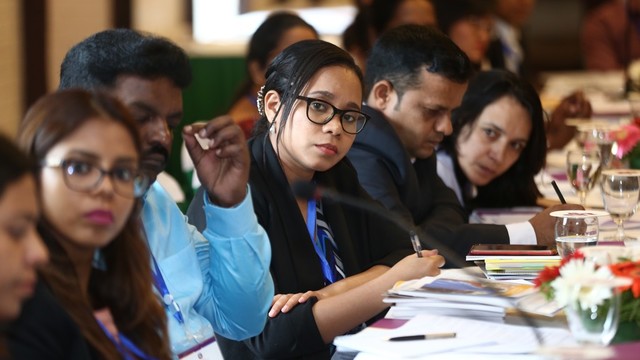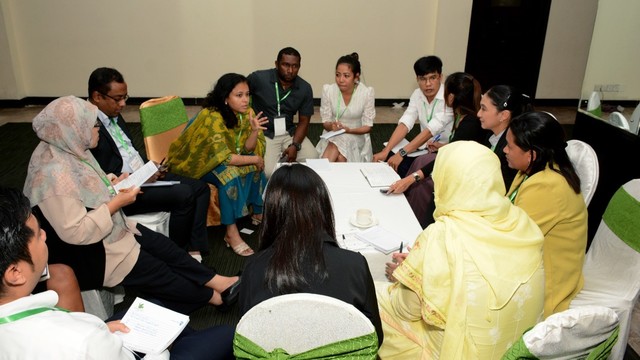Fostering regional collaboration and national implementation
Joint climate negotiation workshops allow country delegates to collaborate and exchange regional knowledge, so climate change issues become an integral part of policymaking across government ministries.

Providing an opportunity for junior negotiators to exchange knowledge and lessons learned is a key part of the regional workshops, like this one in Nepal in 2019 (Photo: copyright Prakriti Resources Centre)
Our training workshops attract UN climate negotiators, many of whom spend most of their time acting as national policymakers. The information they gain there is useful to their role of translating international outcomes into national level implementation, as is the sharing with one another of their own experience in that area.
Our regional workshops are natural conduits for this exchange; a practice we’ve sought to enhance.
Bridging days
By facilitating discussions between the participants representing 15-plus countries at the regional training workshops, we can guide an exchange of experiences on national implementation.
Since 2017, the regional workshops in Africa have taken this a step further by bringing together the Anglophone and Francophone sessions to share lessons related to accessing finance and developing climate policies.
This was accomplished by arranging for the regional training workshops for Anglophone and Francophone Africa to be held during the same week. This allows for an extra day between the workshops – a bridging day – that brings together both groups and extends the length of the workshops at limited cost.
These events foster collaboration in the targeted regions and help ensure climate change issues become an integral part of thinking across government ministries.
Given the post-2020 shift to national implementation, we have also emphasised the two-way nexus between the negotiations and domestic policy – the negotiations must be guided by what implementation requires, and implementation needs to understand what the negotiations imply.
As part of the bridging day, we facilitate peer-to-peer exchanges by starting with 'speed networking' to introduce workshop participants to each other.
And at the end of the regional workshops, we hold small sessions of the thematic groups, where participants are encouraged to think through how they will keep in touch and support one another at the negotiations and after the workshop ends. This is mentioned in the diary written by workshop attendee Danise Love Dennis, from Liberia, who refers to the launch of a ’Junior Negotiators Bloc’ to improve cooperation and information sharing between junior negotiators from developing countries.
In future regional training workshops, we will create more space for lesson sharing and generating key messages to feed into the international process.
Making change happen at home
The training workshops aim to provide participants with practical skills and knowledge to help bring forward the voices of the most climate-vulnerable on international platforms, but also to feed into national climate policymaking.
Response from a participant at the 2019 Asia Pacific regional training workshop in Nepal.It is more comfortable to bring back information to share with my colleagues, especially knowledge learned for negotiation sessions. Moreover, I can better understand the process of NDC implementation to update the NDC my country is soon to submit
Here are a few other examples of how participants have used their learning to input into national level decision-making processes:
- A participant from Benin explained in 2019 at the regional training workshop for Francophone Africa in Ethiopia how he uses his negotiation skills in his role as national focal point: “Sometimes when you work with the private sector, you have to be a negotiator. You don’t always have their concern. For example, when we explain that we need to reduce our greenhouse gas emissions, the private sector doesn’t care. We try to negotiate with them to make the benefits clear to them, and to the country.”
- A participant from the Philippines used information from the workshop to brief their national colleagues on both the strengths and weaknesses of the Paris Agreement, which helped them to form a position. They then used this to push their country to make an informed decision to ratify the Paris Agreement – which the Philippines did in March 2017.
Contact
Brianna Craft (brianna.craft@iied.org), senior researcher in IIED's Climate Change research group
Emmanuel Seck (emmanuel.seck@endaenergie.org), programme coordinator, ENDA Energie




